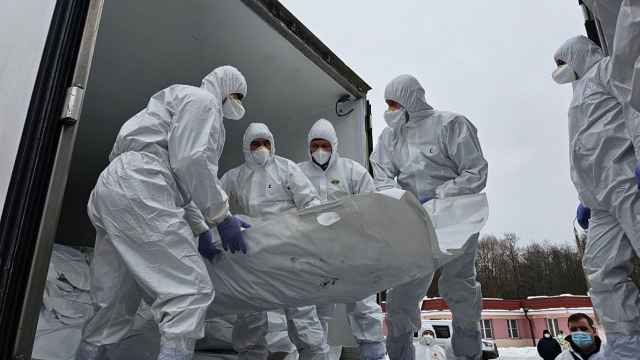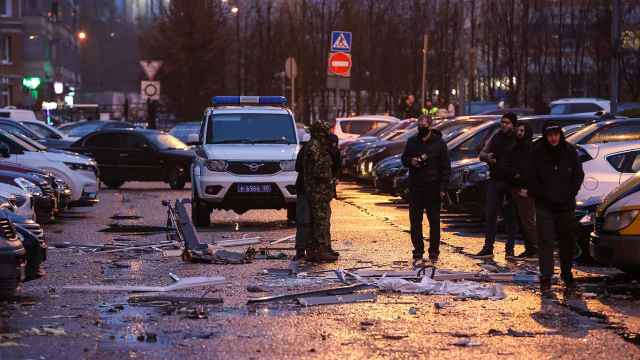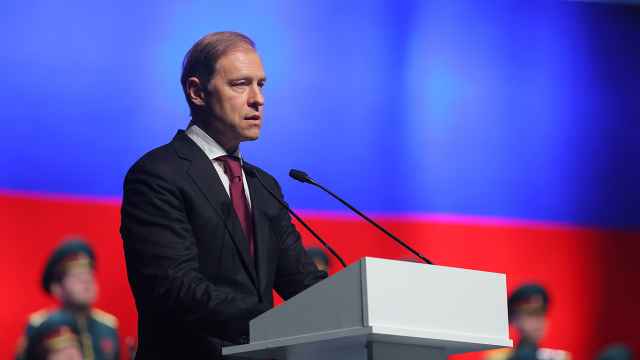Acting Deputy Prime Minister Dmitry Rogozin could take defense tenders under personal control in a measure to facilitate the signing of state contracts, the State Duma’s defense committee said Friday.
The Federal Service for Defense Contracts — the defense procurement watchdog overseen by the Defense Ministry — should report directly to Rogozin, who is in charge of the defense industry, the committee’s first deputy chairman Sergei Zhigarev told journalists, Interfax reported.
“Such an important service should be under direct control at the highest level: … the deputy head of the Cabinet,” Zhigarev said. This “will help solve the problems with missing deadlines to fulfill state defense contracts,” he said.
Among the main functions of the service are supervision of defense tenders, pricing and the quality of defense products.
Rogozin couldn’t be reached for comment Friday. The Defense Ministry declined to comment on the proposal.
Reassigning supervisory functions directly to a specific government official is unlikely to improve the situation with delays in signing defense contracts, which result from the Defense Ministry’s requirement to provide high-quality products and transparent prices, defense expert Igor Korotchenko said.
Given that the corruption level in defense procurement remains very high, reassigning those functions is unlikely to solve the problem of transparent pricing and efficient budget spending for defense needs, he said by telephone.
Having the Federal Service for Defense Contracts report directly to the Defense Ministry would make more sense, because the ministry is the end consumer of defense products and thus makes the final decision on whether they comply with quality standards, said Korotchenko, who is also editor-in-chief of Natsionalnaya Oborona (National Defense) magazine.
President Vladimir Putin said Thursday at a meeting on problems for the defense industry that the Defense Ministry had again failed to sign contracts with arms manufacturers on time.
Although the situation has improved compared with last year, more than one-third of the contracts have yet to be signed, Putin told the meeting.
Last year, the Defense Ministry failed to sign contracts in a timely manner due to disagreements with manufacturers on pricing, which resulted in a series of dismissals in the defense industry.
Rogozin, who participated in the meeting, proposed that the government’s military-industrial commission moderate price disputes between the Defense Ministry and manufacturers.
“We should solve the issue of a fair arbiter, which will hold talks on prices,” Rogozin said, adding that a detailed proposal will be sent to Putin in the near future.
The decision of the political leadership of the country at the end of the 1980s, when advanced developments in hypersonic technology were artificially stopped, can only be labeled as a form of treason, acting Deputy Prime Minister Dmitry Rogozin said Friday, Interfax reported.
The term hypersonic generally refers to a speed five or more times the speed of sound, Francis Gary Powers Jr., director emeritus of The Cold War Museum, told The Moscow Times.
Rogozin added that because of this move Russia is now significantly behind in the area, and he is concerned about the country’s military capabilities in light of efforts by the United States, Germany, Britain, Australia and others who are working on hypersonic weapons.
“Work on such weapons was going on in the U.S.S.R. since the 1960s. Moreover, in many areas we were ahead of the U.S.,” Rogozin said. “Now we are trying to cut corners and make our way to serious developments.”
According to Rogozin, mastering sustainable atmospheric flight at hypersonic speeds is a fundamental and qualitative leap in technology for aeronautics and missile construction, which will allow for building highly efficient weaponry systems that have the newest characteristics.
It’s not just about actually having hypersonic weaponry or its possible implementation, Rogozin added, but the very technology that allows for the creation of such weaponry will itself seriously influence [other] countries and the political situation in the world.
A Message from The Moscow Times:
Dear readers,
We are facing unprecedented challenges. Russia's Prosecutor General's Office has designated The Moscow Times as an "undesirable" organization, criminalizing our work and putting our staff at risk of prosecution. This follows our earlier unjust labeling as a "foreign agent."
These actions are direct attempts to silence independent journalism in Russia. The authorities claim our work "discredits the decisions of the Russian leadership." We see things differently: we strive to provide accurate, unbiased reporting on Russia.
We, the journalists of The Moscow Times, refuse to be silenced. But to continue our work, we need your help.
Your support, no matter how small, makes a world of difference. If you can, please support us monthly starting from just $2. It's quick to set up, and every contribution makes a significant impact.
By supporting The Moscow Times, you're defending open, independent journalism in the face of repression. Thank you for standing with us.
Remind me later.






